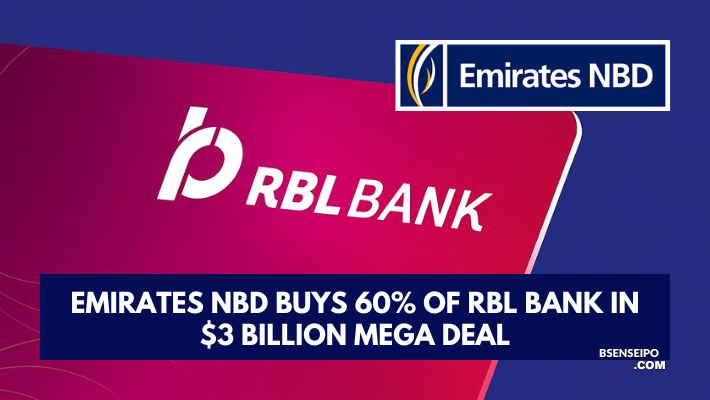Dubai’s Emirates NBD to Acquire 60% Stake in RBL Bank for $3 Billion
In a landmark move in cross-border banking, Dubai-based Emirates NBD is poised to acquire a 60% controlling stake in India’s private sector RBL Bank in a transaction valued at approximately USD 3 billion, sources say. If consummated, this deal would mark one of the largest foreign direct investments into an Indian retail bank, and a bold push by a Middle Eastern institution into India’s financial sector.
Deal Overview & Structure
According to insiders, the acquisition will consist of fresh equity infusion through preferential allotment or rights issuance, enabling the capital to flow directly into RBL Bank rather than secondary sales. Emirates NBD will likely use its Indian wholly owned subsidiary as the acquisition vehicle, after which it may merge or consolidate operations under RBL’s brand.
The timing and structure are subject to rigorous regulatory review by the Reserve Bank of India (RBI), which places caps on foreign shareholding and voting rights in Indian banks. In past cases, foreign banks have faced limits (e.g. 15% or occasionally higher through special approvals).
If the deal goes through, Emirates NBD will command de facto control over RBL’s strategic direction, board composition, and oversight of major resolutions, even if certain voting caps or ring-fencing provisions are imposed.
Strategic Rationale & Synergies
- India Market Entry / Expansion
Emirates NBD’s move reflects its ambition to deepen its footprint in Asia’s fastest growing banking market. India’s banking sector offers strong growth potential, and acquiring control of a domestic bank gives far more leverage than organic branch expansion. - Capital & Balance Sheet Support
The capital injection will help strengthen RBL’s capital adequacy, expand lending capacity, improve provisioning buffers, and possibly fund new business lines like retail credit, digital lending, or cross-border services. - Cross-border & Remittance Banking
The UAE–India corridor is one of the world’s largest remittance and trade corridors. Emirates NBD can channel non-resident Indian (NRI) banking, trade finance, diaspora remittances, and inward/outward flow services through RBL’s branches and network. - Technology / Digital Banking Leverage
Emirates NBD is known for its digital banking investments and fintech capabilities. Integrating these with RBL could accelerate transformation in India’s mid-tier banks.
Challenges & Risks
- Regulatory Hurdles: The RBI may impose caps on foreign ownership or voting caps (e.g. 26% or more in exceptional cases). Approval timelines for change of control in a bank can be lengthy.
- Shareholder Opposition / Open Offer: If the deal involves large stake acquisition, open offer obligations under Indian securities regulations may be triggered, imposing additional cost and share buyback pressure.
- Valuation & Dilution: Issuing fresh equity dilutes existing shareholders. Getting consensus on valuation may be contentious, especially among institutional or retail shareholders.
- Cultural / Governance Integration: Indian banking dynamics differ from UAE. Merging risk cultures, compliance regimes, employee integration, and local market sensitivity is challenging.
- Asset Quality / Credit Risk: RBL’s existing loan portfolio quality, non-performing assets, stress segments, and provisioning adequacy will be under scrutiny; missteps could erode value.
Market & Shareholder Reaction
News of the proposed acquisition sent tremors through the markets. Observers expect RBL Bank’s shares to jump on speculation, though some counter-reports and denials from RBL management have also emerged in the press. (Indeed, in earlier reports RBL denied stake talks as “speculative.”)
Analysts will be watching whether Emirates NBD acquires an initial minority stake and then steps up via an open offer—or goes straight for majority control.
Regulatory & Policy Implications
This deal, if approved, could signal India’s evolving stance on foreign ownership in private banks. India’s banking regulations have traditionally restricted foreign strategic shareholding, but in recent years special exceptions (e.g. in Yes Bank/SMBC deal) have paved the way for more leeway.
Moreover, the RBI’s earlier “in-principle” nod to allow Emirates NBD to convert its existing Indian branches into a wholly-owned subsidiary suggests the regulator is open to deeper foreign bank participation. (Reuters)
Outlook & What to Watch
- Confirmation of deal terms: exact stake, price, structure
- Formal filings, board approvals, and shareholder votes
- RBI’s decision on voting caps, control change, and cross-control guidelines
- Timing of capital infusion and open offer (if triggered)
- RBL’s post-deal business strategy: branch expansion, digital push, international banking
- Market reaction—share price of RBL, competitor moves, investor sentiment
If completed, the Emirates NBD–RBL Bank transaction could become a bellwether for future cross-border banking M&A in South Asia, and mark a new chapter in India-UAE financial integration.




